Get Matched With Health Services Colleges
A dental hygienist’s role in a dentist’s office, dental hygiene care facility, or community dental health clinic is vital. Without their work, the dentist would be dramatically slowed down in how many patients they could see in a single day. In dental hygiene education programs, you’ll learn how to assess the dental health of your patients with oral health screenings, create a treatment plan and, with the dentist, discuss possible treatment options. You’ll also apply preventative treatments to keep patients from developing cavities and address issues with their gums.
Once you graduate from your dental hygiene program, you’ll have to take the dental hygiene national board examination and state exam to receive certification to practice. This is necessary whether you’ve received an Associate of Applied Science in Dental Hygiene, a Bachelor of Science, or completed a post-degree certificate program. Once you receive your license, you’ll be able to add the letters “RDH” after your name. This stands for “registered dental hygienist”. Those with this certificate and license will have access to an entry-level career in dental hygiene and be able to start work as oral health professionals.
Those looking to become dental hygiene students should look for schools that have dental hygiene education programs and accreditation. A school of dentistry may offer dental hygiene programs ending in an Associate of Applied Science in Dental Hygiene or a Bachelor of Science degree. However, dental hygiene students are likely going to need transcripts that prove the completion of prerequisite courses to get into these dental hygiene education programs. Most of these prerequisites will cover basic science, but all of your oral health and dental hygiene learning will be provided in the courses you take for your certificate or bachelor's degree. Graduates will be fully prepared to enter the dental hygiene profession.
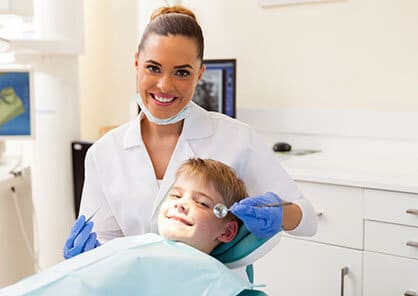
Components of a Successful "Dental Hygienist Career"
A dental hygienist will be required to work with people all day every day. And, as you might know, some people don’t particularly like going to the dentist. This means that oral health professionals will be interacting with people who simply don’t want to be there. It’s nothing against you, but you’ll need to have a thick skin to deal with people who may or may not be on their best behavior in an uncomfortable or tense situation when they are forced to go to their community dental health clinic or a dental hygiene care facility. Interpersonal skills and communication will be your most important, and most used, skills in a career in dental hygiene.
Compare Popular Online Health Services Programs
What Does a Dental Hygienist Do?
On the job, expect to review each patient’s health profile and closely examine their teeth and oral structures, some patients will also require X-rays. You’ll assist the dentist in developing a treatment plan to control oral disease and work with the patient to develop a dental hygiene plan that works for them. You’ll remove plaque from your patient’s teeth (known as periodontal debridement) and may apply a preventative sealant. Some will need fluoride and desensitizing agents applied to their teeth. If the patent is undergoing any dental procedure, you may administer nitrous oxide or numbing shots.
You’ll assess your patient’s oral health and let the dentist know what you find. You’ll document each patient’s care (either with pencil and physical files or on a tablet), then educate your patient about good oral protection techniques (brushing and flossing). You will counsel patients on choosing the correct toothbrushes (soft or hard bristles and dental floss). You’ll also show patients how to use floss and toothbrushes correctly. This may mean teaching very young children how to brush their teeth.
What is the Difference Between Dental Schools and Dental Hygienist Schools
Dental schools teach their students specific science courses that aren’t taught in dental hygiene programs. While much of what you learn in dental hygiene programs will be the same as what a dental school teaches, this doesn’t mean that the two are interchangeable. Also, dental students spend some of their undergraduate years immersed in a heavy science-oriented program completing prerequisite courses. Dental hygiene students are also expected, if not required, to take a heavy liberal arts course load.
In contrast, a dental hygiene program teaches you how to practice dental hygiene. As a dental hygiene student, you won’t have such a strong emphasis on science or liberal arts.
Typical Dental Hygienist Trade School Requirements
Before you enroll into a dental hygiene program, you should have your high school diploma or its equivalent (GED). Some dental hygiene programs will require that you have a certificate from a pre-dental hygiene program with a minimum GPA. Also, you’ll have to satisfactorily pass your pre-enrollment interview.
No matter which state you live in, you will be required to hold a state-level dental hygienist’s license. To reach this step, you’ll have to pass a state or regional and a national clinical licensing exam.
Find Your Online Program
Academic Standards for Dental Hygiene Courses
As you enter an accredited dental hygiene program, you’ll take general education classes, then move into specialized classes in oral science and biomedical science. While you’re going through the dental hygiene program, you’ll have to maintain a certain GPA, pass each class with a minimum grade and show competence in each practice skill.
Before you are accepted into a dental hygiene program, you’ll have to show proof of good health, immunization, and sufficient antibody titer levels for mumps, rubella, meals and varicella (chicken pox). This is shown through a lab-run blood test which shows that you have received appropriate vaccinations. You’ll have to take an annual tuberculosis test and have negative results to continue and show proof of having received a Hepatitis B vaccine. If you decline the vaccination recommendation you may be allowed to sign a waiver of responsibility before being allowed into the program.
Exams and Experience Needed
Some schools will look for experience in the dental assisting field. You’ll be awarded credit for time spent in a dental assisting position within five years before you apply to the dental hygiene program. If you take part in a dental hygiene observation, you will receive a set amount of credit for any dental assisting certification that you may hold.
Dental Hygienist Degree & Certification Options
Dental Radiography
As a dental hygienist, you’ll routinely take patient X-rays, so you can develop appropriate treatment plans. Some dental hygiene programs offer this as a secondary program; others offer it as a part of a primary dental assistant with radiology program.
Dental Anatomy
Dental anatomy is taught as a part of your dental hygiene program. You’ll learn about tooth anatomy and root morphology, and head and neck anatomy.
Prevention of Oral Disease
Every good dental hygiene program focuses on the prevention of oral disease. As a dental hygienist, it’s a large part of your role to look for and counsel your patients on keeping their teeth and mouths healthy. This includes teaching them about gum disease and tooth decay.
Dental Hygiene Clinical
In your dental hygiene program, you’ll take part in a dental hygiene clinical. That is, you’ll practice your clinical service skills and receive needed clinical experience. Clinical skills include any that mean you are working directly with patients, delivering dental care, and counseling patients about good dental hygiene practices.
Oral Pathology
“Oral pathology” means the fundamentals of gross pathology, microscopic pathology, and the general pathological processes. In a dental hygiene program, this focuses on diseases of periodontal and dental tissues, to include supporting oral structures. As a dental hygienist, you’ll be heavily involved in seeking out signs of oral disease.
Associates & Certification Cost
With the national average tuition being $3,468 for a two-year public school, you should also know that some schools have lower tuitions to offer to students. From California and New Mexico, Arizona to Puerto Rico, incoming students can pay as little as $842 and as high as $1,138.
Looking at the community colleges with the most expensive tuition rates, you’ll see numbers like $5,610 on the low end of the highest tuition rates. The highest rate is $12,192. All of these are straight tuition, not net prices which would include room and board, books, and lab fees. There are several dental hygiene degree level options available to students looking to pursue this career.
Find Online Health Services Colleges
Potential Careers & Salaries for Dental Hygienist Graduates
The certification versus AAS degree has an impact on the salary a dental hygienist is paid throughout their career. While their work responsibilities are likely to be identical, that option makes the difference in pay.
Both hygienists work directly with patients, obtaining X-rays, cleaning and polishing teeth, flossing, applying fluoride and preventative sealant, and educating patients on proper dental care. Some hygienists will work with orthodontists, doing the same job duties. However, their patient care will be specific to patients getting braces or learning about caring for their teeth as they wear their braces.
Dental Hygienist Median Salaries by Occupation
| Occupation | Entry-Level Salary Range | Mid-Career Salary Range | Late-Career Salary Range |
|---|---|---|---|
| Dental Hygienist, AAS | $56,100 | $61,100 | $62,600 |
| Dental Hygienist, Cert. | $29,000 | $48,966 | $73,000 |
| Registered Dental Hygienist | $52,700 | $61,200 | $63,600 |
| Dental Office Manager | $44,100 | $51,000 | $53,900 |
| Dental Insurance Coordinator | $30,000 | $37,200 | $41,500 |
| Practice Administrator | $56,500 | $71,900 | $80,900 |
Important Questions to Ask (FAQ)
How Long Does It Take to Earn a Dental Hygienist Certification?
Most schools of dental hygiene structure their programs so they last for approximately two years or four semesters. In credits, this is about 80 to 83 credit hours. In this two-year program, your education will be complete, filled with basic sciences and clinical dental hygiene courses.
How Much Does Dental Hygienist Trade School Classes Cost?
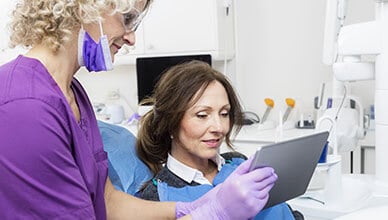
One trade school has set its per-term tuition and fees at $2,509. For both semesters, the entire bill for just tuition will be $5,018. Your supplies and books will cost you separately. You’ll also have other indirect costs, such as transportation, personal, room and board, and miscellaneous.
How Many Students Graduate “On Time,” in 12 or 24 Months?
Many first-generation trade, vocational, or community college students were unable to continue pursuing a postsecondary degree. Fifty-four percent of these students said they couldn’t afford going to school; in comparison, 42% said that a change in their family status forced them to stop taking classes. Another 31% of students said that they were experiencing conflicts with family demands and 25% said they were forced to stop attending school because of injury, personal problems, or illness.
That being said, it is possible to graduate on time from one of these programs. If you take a full course load each semester and make sure the program you attend is competitive, you will have a better chance of graduating on time.
What Kind of Accreditation Does the Online Program Hold? How is it Regarded in the Field?
Dental hygiene programs are accredited by the Commission on Dental Accreditation (CODA). This accreditation organization is highly thought of in the dental health field.
In addition, trade and vocational schools, as well as community colleges should receive school or college-wide accreditation. If a school is able to maintain its accreditation through several review cycles, this means that its faculty and educational offerings are of high quality.
Software, Technology & Skills Needed
As a dental hygienist, you should hold several skills that will allow you to do your job well. These include:
- Good vision (corrected or natural)
- Good hearing or corrected hearing in at least one ear
- Good fine and gross motor skills
- Good physical endurance and strength—your work will be strenuous
- Communication skills so you can communicate well with patients and the dentist
- Excellent conceptual, intellectual, and cognitive skills
- Excellent professional demeanor and attitude
Find Your Program
Dental Hygienist Trade School Scholarships
-
Carol Bauhs Benson Scholarship
Amount: $1,000
Deadline: February 1
This scholarship is limited to Wisconsin, South Dakota, North Dakota, and Minnesota. Students in associate degree dental hygiene programs can apply and compete for one annual award of $1,000. This scholarship was formed to honor the memory of Carol Bauhs Benson.
-
Sigma Phi Alpha Associate Scholarship
Amount: $1,000
Deadline: February 1
One scholarship, in the amount of $1,000, is awarded to an associate-level student who is pursuing a dental hygiene degree. That student must be an active member of an active chapter of the Sigma Phi Alpha Dental Hygiene Honor Society.
-
Karla Girts Memorial Community Outreach Scholarship
Amount: $2,000
Deadline: February 1
Proctor and Gamble created this scholarship in memory of Karla Girts, BSDH, RDH, past president of ADHA, and former Chair of ADHA Institute for Oral Health. Applicants should demonstrate a commitment to improving the oral health within the elderly population. These students should also have a GPA equal to or above 3.0.
Professional Dental Hygienist Trade School Organizations
- ADHA
- HDHA
- NDHA
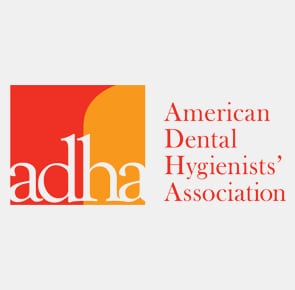
ADHA
American Dental Hygienists’ Association
This is the leading national organization for dental hygienists, with more than 120,000 RDH members in the U.S. ADHA’s mission is to “advance the art and science of dental hygiene by ensuring access to quality oral health care. . .”. ADHA also promotes high standards of education in dental hygiene, licensing, practice, research, and representing and promoting interests of dental hygienists.
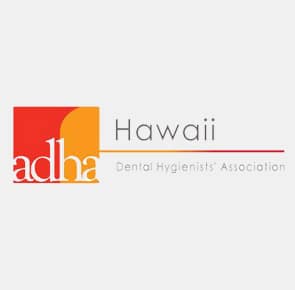
HDHA
Hawaii Dental Hygienists’ Association
HDHA works to advance the practice of dental hygiene. Its main goal is to ensure access to high-quality healthcare, spread the word about the cost effectiveness of prevention by promoting the highest dental hygiene standards for education, licensing, practice, and research.
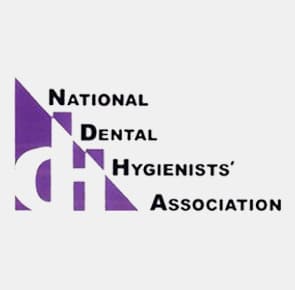
NDHA
National Dental Hygienists’ Association
NDHA was founded by African-American dental hygienists to focus on the special issues that minority dental hygienists face in the profession. NDHA promotes the highest ethical and educational standards for dental hygienists and establishes positions that impact the profession. NDHA aids in increasing access to oral care for under-served communities.
Choosing an Accredited Dental Hygienist Vocational School
Any good dental hygiene program should be accredited. This should be one of the first (if not the first) thing for you to look for in a high-quality dental hygiene school. It should be institutionally accredited by the Accrediting Commission of Career Schools and Collages (ACCSC). Look for faculty that has been employed at the college for several years.
Getting into an accredited dental hygiene program means you’ll be able to receive financial aid and you may also receive a higher salary offer.
Online vs. On-Campus vs. Hybrid
On-campus classes are taken when you are physically on-campus and in a classroom. You interact more with fellow students and your professors. On the down side, your classes take place as scheduled—there is no flexibility if something comes up.
You take your online classes at days and times convenient for you, even if this is at 3 a.m. two days a week. In this format, you won’t have face-to-face interaction with your professors or fellow students. However, you will save money on room, board, and transportation.
Hybrid classes are a blend of both on-campus and online. You’ll spend most of your class time online, working on assignments. You’ll have one or two “residence” weekends, where you’re on-campus for your classes. Or, you can take classes with hands-on components on campus and more academic classes online.
Additional Questions
Does the Vocational School Have Post-Graduate Job Placement Assistance?
You need help finding a good job after your graduation. Get help in creating your resume or a cover letter for the positions you’re interested in. Take part in mock interviews and learn how to negotiate salary offers as well. Your vocational school may also have career fairs and employer events—take part! This is a great opportunity to both get out there and get to know the providers and employers in your area and to learn how to search for a job yourself.
Why You Need to Consider the Overall National Rankings of the School and its Effects on Your Career or Salary
The national ranking of your community college can affect your future salary. Depending on which school you choose and how its offerings may be ranked, each school is given a weighted average of each score earned by each community college in each state. That, along with the number of students enrolled in each school affect the ranking. The school with the highest average ranking receives the highest rank. If you live in a state whose schools ranked high, your future employer may notice this and give you a higher salary offer.
As you look at each school in your state, learn how each one ranks for your degree program.
